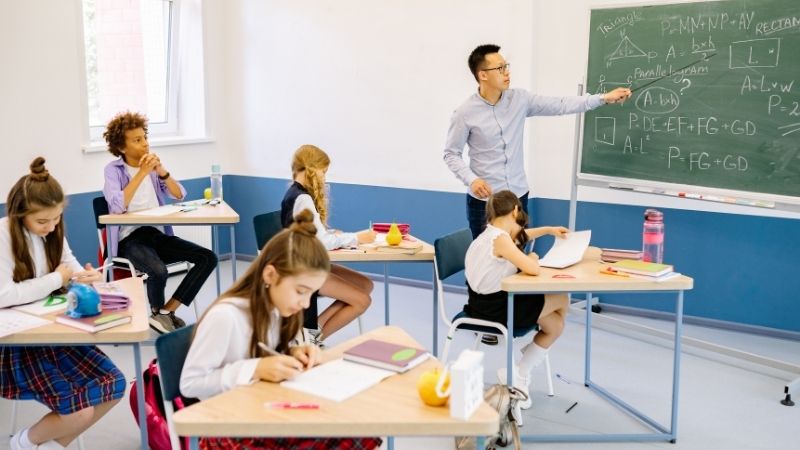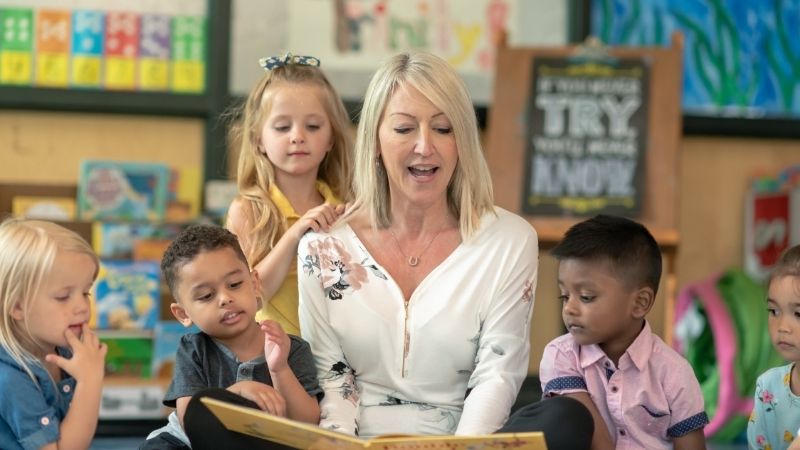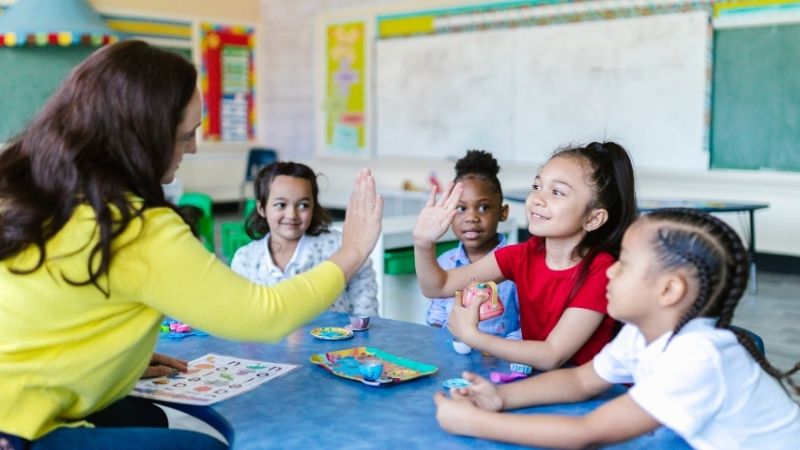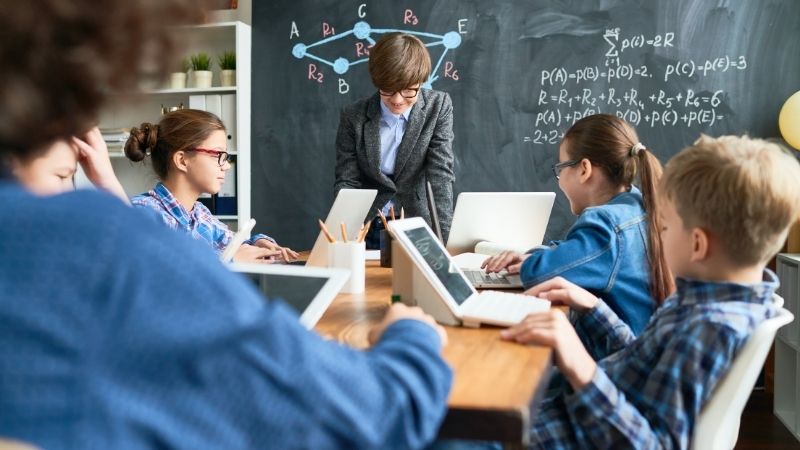
Effective collaboration is crucial in special education settings, as it enhances the overall quality of education provided to students with diverse needs.
However, one might argue that team teaching and collaboration among support staff, paraprofessionals, specialists, and administration can be challenging due to the complexity of roles and responsibilities involved.
This article aims to shed light on the importance of team teaching and elaborate on the significant roles played by various stakeholders in fostering valuable collaboration within special education environments.
By understanding these roles and implementing effective strategies for collaboration, educators can create an inclusive learning environment that meets the unique needs of every student.
Key Takeaways
- Effective collaboration in special education leads to improved student outcomes and increased efficiency in meeting educational goals.
- The roles of support staff, paraprofessionals, specialists, and administration are crucial in fostering valuable collaboration in special education.
- Team teaching in special education provides diverse perspectives and expertise, increases individualized support for students, and promotes effective team dynamics and problem-solving.
- Strategies for effective communication in collaborative teams, such as active listening, clear communication guidelines, and regular check-ins, are essential for fostering collaboration in special education.
The Benefits of Team Teaching in Special Education
The benefits of team teaching in special education include the ability to provide a diverse range of perspectives and expertise, increased individualized support for students, and improved collaboration among educators. Co-teaching allows for the integration of different teaching styles and approaches, which can lead to a more comprehensive educational experience for students with special needs.
By working together, teachers can combine their unique strengths and knowledge to address the specific learning needs of each student. This collaborative approach also promotes effective team dynamics, fostering a positive working environment where ideas are shared openly and problem-solving is done collectively.
Additionally, team teaching encourages professional growth as educators learn from each other's experiences and gain new insights into instructional strategies that may benefit all students. Overall, team teaching in special education has numerous benefits that enhance student learning outcomes while promoting effective collaboration among educators in pursuit of academic success for all individuals involved.

Understanding the Role of Support Staff in Collaborative Environments
This discussion focuses on the vital contributions of support staff in collaborative environments and the benefits that result from such collaboration.
Support staff play a crucial role in facilitating effective teamwork among educators, administrators, and specialists in special education settings.
Their expertise and assistance contribute to the overall success of collaborative efforts, leading to improved outcomes for students with special needs.
Support Staff's Vital Contributions
Support staff, including paraprofessionals, specialists, and administration, play a crucial role in fostering valuable collaboration in special education through their vital contributions.
In a collaborative environment, support staff are key facilitators of effective teamwork and coordination among professionals involved in the education of students with special needs.
Their diverse skills and expertise enable them to provide essential assistance to teachers and other personnel in addressing the unique learning requirements of these students.
Support staff contribute to collaboration by offering specialized knowledge, implementing individualized interventions, providing instructional support, conducting assessments, and assisting with administrative tasks.

By working closely with teachers and other professionals, they enhance communication and cooperation within the team.
The benefits of such collaboration include improved student outcomes, increased efficiency in meeting educational goals, enhanced professional development opportunities for all team members, as well as increased overall satisfaction among educators.
Benefits of Collaboration
Collaboration among professionals in the education of students with special needs can lead to improved student outcomes, increased efficiency in meeting educational goals, enhanced professional development opportunities, and increased overall satisfaction among educators. The benefits of collaboration are numerous and impactful.
Effective communication techniques play a crucial role in fostering successful collaborative efforts. Clear and open lines of communication allow professionals to share information, exchange ideas, and coordinate their efforts effectively. This enables educators to tailor instruction to individual student needs more efficiently and implement evidence-based practices consistently.
Additionally, collaboration promotes a sense of collective responsibility for student success, creating a supportive network that can provide valuable feedback and support. By working together, professionals can develop comprehensive plans that address students' unique learning needs holistically.
As we explore the importance of collaboration in special education, it is essential to recognize the crucial role paraprofessionals play in facilitating this collaborative process.
Transition: Understanding the significance of effective collaboration lays the foundation for recognizing the critical contributions made by paraprofessionals in special education settings.

The Crucial Role of Paraprofessionals in Special Education Collaboration
Paraprofessionals play a crucial role in facilitating effective collaboration within the realm of special education. Their involvement is essential for creating a supportive and inclusive learning environment for students with disabilities. Here are four key aspects related to the importance of paraprofessionals in special education collaboration:
Training requirements: Paraprofessionals undergo specialized training to acquire the necessary skills and knowledge to work effectively with students who have diverse needs.
Support on student outcomes: The presence of paraprofessionals has been shown to positively impact student outcomes, including academic achievement, socialization, and behavioral improvements.
Individualized assistance: Paraprofessionals provide individualized support to students, helping them access the curriculum, participate in activities, and develop independence.
Collaborative teamwork: Paraprofessionals collaborate closely with teachers, therapists, and other professionals to implement strategies that address students' unique needs.
Understanding the critical role played by paraprofessionals sets the stage for exploring how specialists also contribute to effective collaboration in special education.
How Specialists Contribute to Effective Collaboration in Special Education
Specialists in the field of special education bring specialized knowledge and expertise that contribute to effective interdisciplinary problem-solving. Their expertise plays a pivotal role in fostering collaboration within the realm of special education. Effective collaboration models rely on specialists' unique skills to address complex issues and provide tailored interventions for students with disabilities.

Specialists, such as speech-language pathologists, occupational therapists, and behavior analysts, possess in-depth understanding of specific areas related to special education. They utilize evidence-based practices and data-driven decision-making to support student learning and development.
In collaborative settings, specialists work closely with other professionals, including teachers, administrators, support staff, and paraprofessionals. Together, they create an inclusive environment where students can thrive academically, socially, and emotionally.
Administration's Role in Fostering Collaboration in Special Education
Administrative leaders play a crucial role in facilitating the coordination and organization of interdisciplinary efforts within special education settings. Their involvement is essential for promoting collaboration among educators, support staff, specialists, and other stakeholders involved in the provision of special education services.
To foster effective collaboration, administrators can implement various strategies:
Establishing clear communication channels: Administrators should create an open line of communication to ensure that all team members are informed about important information, updates, and decisions.
Providing professional development opportunities: By offering training sessions and workshops focused on collaboration skills, administrators can enhance the capacity of educators to work together effectively.
Encouraging shared decision-making: Administrators should promote team-based decision-making processes to ensure that different perspectives are considered when making important choices regarding students' educational needs.

Creating a supportive culture: Administrators play a vital role in cultivating a positive and inclusive school culture where collaboration is valued and supported.
Building Effective Communication Channels for Collaborative Special Education Teams
Effective team communication techniques and clear communication guidelines are crucial for fostering collaboration within special education teams.
By enhancing team communication techniques, such as active listening and open dialogue, members can effectively share information, ideas, and concerns.
Additionally, establishing clear communication guidelines ensures that all team members understand their roles and responsibilities, promotes consistency in communication practices, and minimizes misunderstandings or conflicts that may arise.
Enhancing Team Communication Techniques
To optimize collaboration within special education teams, implementing effective communication techniques is crucial. Here are four techniques that can enhance team communication and improve team dynamics, fostering trust and respect:
Active Listening: Encouraging active listening ensures that team members fully understand each other's perspectives and concerns. This technique involves giving undivided attention, asking clarifying questions, and summarizing key points to demonstrate comprehension.
Clear and Concise Communication: Using clear and concise language helps avoid misunderstandings and promotes efficient collaboration. Team members should focus on providing relevant information, avoiding jargon or technical terms that may be unfamiliar to others.

Regular Check-ins: Scheduling regular check-ins allows team members to provide updates on progress, discuss challenges, and seek support from one another. These meetings can be in person or virtual but should prioritize open dialogue where everyone has an opportunity to contribute.
Respectful Feedback: Providing constructive feedback in a respectful manner encourages growth and improvement within the team. Team members should focus on specific behaviors or actions rather than personal judgments when offering feedback.
Establishing Clear Communication Guidelines
Establishing clear communication guidelines ensures that team members have a shared understanding of expectations and procedures for exchanging information. Clear guidelines help to establish trust among team members, as they provide a framework for open and honest communication. By clearly defining roles, responsibilities, and protocols for sharing information, these guidelines ensure that everyone has access to the necessary information to support students with special needs effectively.
In the context of special education, effective communication is crucial for fostering collaboration and promoting inclusivity within the team. By establishing clear channels of communication, such as regular team meetings or digital platforms for sharing updates and resources, team members can stay connected and informed about each student's progress and any necessary adjustments to their individualized plans.
Overall, clear communication guidelines play a vital role in facilitating effective collaboration in special education settings.
Strategies for Successful Collaboration in Special Education Settings
Strategies for successful collaboration in special education settings involve clear communication, defined roles and responsibilities, and regular team meetings.
Effective communication strategies are essential to ensure that all team members are on the same page and can effectively share information and resources. This can include using clear and concise language, active listening techniques, and utilizing visual aids or assistive technology when necessary.

Promoting inclusivity in collaborative environments is also crucial. Creating a safe and welcoming space where everyone's ideas and perspectives are valued helps foster a sense of belonging among team members.
Additionally, establishing defined roles and responsibilities ensures that each team member understands their specific contributions to the collaboration process.
Regular team meetings provide opportunities for ongoing communication, problem-solving, and planning future actions to support student success.
Frequently Asked Questions
What Are the Qualifications and Training Required for Support Staff in Collaborative Special Education Environments?
Qualifications and training for support staff in collaborative special education environments include relevant degrees, certifications, and experience. Training should cover areas such as understanding special needs, implementing individualized education plans, and promoting effective communication and collaboration within the team.
How Do Paraprofessionals Provide Additional Support to Students With Special Needs?
Paraprofessionals play a crucial role in inclusive classrooms by providing additional support to students with special needs. Through team teaching, they contribute to the overall benefits of collaboration, enhancing student learning and fostering a more inclusive educational environment.
What Are Some Examples of Specialists in Special Education and How Do They Contribute to Collaboration?
Speech therapists play a crucial role in promoting communication skills in special education, while occupational therapists are essential for developing independence and life skills in students with special needs. Their expertise contributes to collaboration by addressing specific areas of need.
How Does Administration Support and Facilitate Collaboration Among Special Education Teams?
The role of administration in promoting collaboration among special education teams is crucial. They can support and facilitate collaboration by providing resources, establishing clear communication channels, and fostering a collaborative culture within the school setting.

What Are Some Effective Strategies for Building Trust and Effective Communication Within Collaborative Special Education Teams?
Building rapport and effective problem solving are crucial for trust and communication within collaborative special education teams. Strategies such as open and respectful communication, active listening, regular team meetings, and clear expectations can foster these important elements of collaboration.
 Careers in EducationElementary EducationHigh School EducationEducational TechnologyTeaching StrategiesSpecial EducationPrivacy PolicyTerms And Conditions
Careers in EducationElementary EducationHigh School EducationEducational TechnologyTeaching StrategiesSpecial EducationPrivacy PolicyTerms And Conditions
